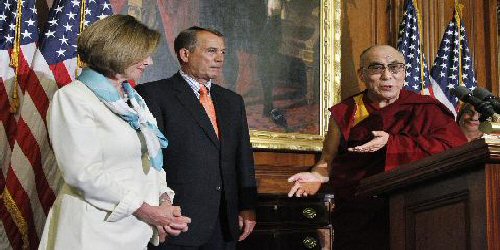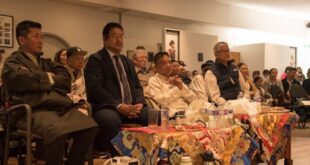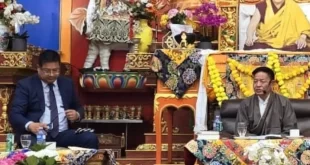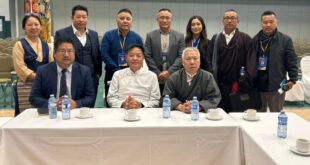On July 7, 2011, His Holiness continued with his preparatory prayers for the Kalachakra initiations and was also welcomed in the United States Congress by Speaker John Boehner and congressional leaders from both the Republican and the Democratic parties. Highlighting the traditional bipartisanship that the issue of Tibet enjoys in the Congress, Speaker Boehner said today, “…our commitment to the Tibetan people has always brought the two parties together, and I expect it will continue to do so, no matter how long it takes.”
Today’s preparatory session at the Kalachakra venue included the ritual earth purification dance and the initial process of marking the board on which the Mandala will be constructed.
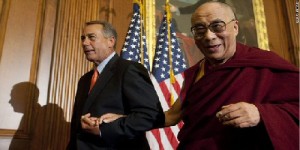
His Holiness visited the Capitol in the afternoon for a meeting with Speaker John Boehner, who had also invited a bipartisan group of six leaders, which included former Speaker and now Minority Leader Nancy Pelosi; Congresswoman Ileana Ros-Lehtinen, Chairwoman of the House Foreign Affairs Committee; Congressman Howard L. Berman, Ranking Member of the House Foreign Affairs Committee; Congressman Chris Smith, Chairman of the House Foreign Affairs Subcommittee on Africa, Global Health, and Human Rights; Congresswoman Nita Lowey, Ranking Member of the House Committee of Appropriations’ Subcommittee on State, Foreign Operations, and Related Programs; and Congressman Frank Wolf, Chairman of the House Appropriations Committee’s Subcommittee on Commerce, Justice, Science, and Related Agencies.
His Holiness and the members of Congress exchanged views on the situation in Tibet and China. Members of Congress expressed their admiration for His Holiness’ commitment to non-violence and for being an inspiration.
Following their meeting, Speaker Boehner, Congresswoman Pelosi and His Holiness addressed the press.
Speaker Boehner began by saying, “It is truly an honor and privilege to welcome the Dalai Lama to the United States Capitol. The bond between the Dalai Lama and the American people has been strong for so long that it’s no surprise his visits are highly anticipated. And I think rightly so. Wherever he goes, the Dalai Lama makes his tireless dedication to the values that we all cherish. He makes them apparent, and he makes it a bit contagious. His example humbles nations such as ours that work to spread freedom, tolerance, and respect for human dignity. And it sustains those who struggle to secure these universal values for themselves and for their families. Here in the Congress, our commitment to the Tibetan people has always brought the two parties together, and I expect it will continue to do so, no matter how long it takes.
“So we appreciate the Dalai Lama taking the time to speak with us about how we can help spread our shared values, not just in Tibet and China, but in the Middle East as well. “We extend to you, Your Holiness, on behalf of people whom we serve, our solidarity, our support and our hope that you will come back soon.”
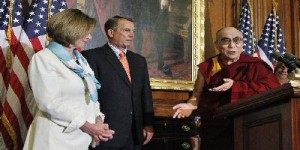
Representative Nancy Pelosi spoke next and began by thanking the Speaker for organizing the meeting. She echoed the Speaker’s view that His Holiness and the issue of Tibet engendered a spirit of bipartisanship in the United States Congress. Pointing to her colleagues from both the parties that were standing beside them, Congresswoman Pelosi said she was proud of the fact that they have come together under the dome of the Capitol a number of times to honor His Holiness. She also recalled President George W. Bush visiting the Capitol to present the Congressional Gold Medal to His Holiness in 2007 (which she said honored the commitment of His Holiness to peace, to nonviolence, to human rights and religious understanding.) and President Barack Obama receiving His Holiness in the White House.
She then talked about the historical relationship between His Holiness and the United States saying, “When he was a very little boy and first became the Dalai Lama, President Franklin Roosevelt sent him a watch. Recognizing his love, even as a little boy for science and technology, it was a watch that had the phases of the moon.” “ So it is with great admiration and historic honor to join the Speaker and our colleagues, in a bipartisan way to welcome His Holiness,” Congresswoman Pelosi added.
Speaker Boehner next presented His Holiness to the media
His Holiness first began by saying “I have nothing to say,” which aroused much laughter among the people gathered there.
His Holiness then explained the nature of his current visit to Washington, D.C. This time the main purpose in coming to Washington, D.C. is to give one important Buddhist tantric teaching, he said. “However, since I am here it is my duty to see my old friend, and also this House always give us inspiration. So it is my duty to come here and to say thank you,” he added.
His Holiness said he also came to explain why he had handed over all his political authority to the elected Tibetan leadership. He said this 14th Dalai Lama had voluntarily, happily, and proudly relinquished the historical authority of the Dalai Lamas. He added that the main reason for his decision was that it was his view that rule by kings and queens or religious leaders was out of date. He had also been maintaining that religious and political institutions must be separate. Therefore, he felt it was somewhat hypocritical for him to be combining the two roles while telling others that they should be separate. His Holiness said that he also thought it was the right time to devolve his authority as the Tibetan community outside of Tibet was quite matured in democratic practice. He said he had full confidence that they can shoulder full responsibility so that his time could be devoted to promotion of human value and promotion of religious harmony.
His Holiness said that this was not a sudden decision but something that he had ben thinking of for a long time. He said since his childhood he had been critical of the administrative system in Tibet.
Here he talked about the contrast in experience that he had while visiting Beijing in 1954 and India in 1956. In 1954 he went to Beijing as a member of the Chinese National People’s Congress and witnessed how silent and disciplined the members were. In India, he said the Parliament was full of noise and seeming to have no discipline. He witnessed the Indian parliamentarians criticizing the government and the then prime minister, Jawaharlal Nehru. He was thus impressed by the freedom of speech and freedom of thought in India.
His Holiness said that after coming to India as a refugee in 1959, he began democratization process. By 2001 we already achieved elected political leadership, he said, adding that since then his position was semi-retirement. He said now 10 years had passed and that now the semi retirement must be complete retirement. His Holiness added that our small organization in exile was fully democratic. “So we really feel very proud,” he said adding that he felt it was “ my duty to report to my long time supporter and long time friend.”
His Holiness then returned to his hotel.
